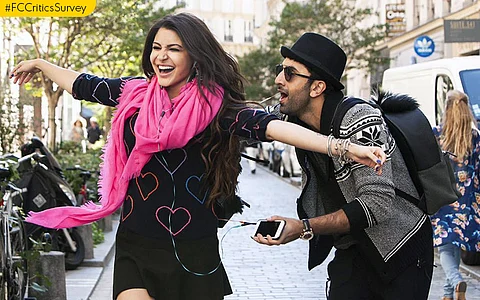
- Reviews
- Power List 2024
- Cannes 2024
- In-Depth Stories
- Web Stories
- News
- FC Lists
- Interviews
- Features
- FC SpecialsFC Specials

In a new series, FC Critics Survey, every few weeks we ask a handful of film critics one question. This week we ask – what's the worst movie plot twist ever?
Instead of trying to honestly resolve its one-sided love story, Ae Dil Hai Mushkil takes the easy way out, giving the unwilling object of affection cancer (two hours into a 157-minute film). It's a cheap deus ex machina, bestowing a kind of martyrdom on the childish Ayan instead of making him face up to reality. It also gave us this self-pitying gem: "Pyaar cancer ki tarah hota hai – bin bulaye aa jaata hai aur maar ke chala jaata hai." Years later, Karan Johar confirmed that he'd included the twist to "punish" Alizeh for not loving Ayan.
I found it extremely hard to connect with this film, full of inexplicable back and forth jumps between realism and fantasy. But when Bauua gets launched into space, reaches Mars and on his return trip gets lost in space only to be found a decade or so later, all within the matter of a minute in the screenplay, I was ready to forget entirely about this mess of a movie. Admittedly this random twist happens right at the end, but shouldn't the end really be the strongest part of a film?
If one wishes to learn the difference between shocking and sadistic, please watch Ek Duuje Ke Ke Liye. Kill your creations, sure. But not only because you can. The ghastly plot twist at the climax of this 1981 romance, which starts out as a cheerful courtship between a South Indian boy and North Indian girl in Goa, is all kinds of offensive. The said couple goes through enough trial and tribulations to deserve such an extreme fate. Ek Duuje Ke Ke Liye's insistence on humiliating their spirit doesn't make any sense. Nor does it feel organic. More than its completely needless disruption of their reunion though, it is the horrifying manner in which it is conducted –rape, battering, suicide that undoes everything (otherwise) favourable about the movie — fabulous soundtrack, striking cinematography and the unbridled chemistry between Kamal Haasan and Rati Agnihotri.
When it comes to plot twists in movies, any list is incomplete without the mention of Abbas-Mustan. The men in white have made many thrillers, but none is more memorable, more perversely enjoyable, than Race. Most bad films have a ludicrous plot twist. Race—with a plot twist every 10 minutes, one cancelling out the other, rendering the film, in effect, a muddled math problem—is a gigantic plot twist with some movie in it. It obviously doesn't end at that. After every shocking revelation, the characters say, "Yahi toh mera plan tha", looking menacing and serious. Delicious.
To be fair, I am not sure this qualifies as the worst movie plot twist ever, but it is certainly on my worst-twist-in-a-good-movie list. Director Anurag Kashyap's Paanch (2003, Hindi) was about the unending vortex of violence into which we risk getting sucked by the commission of a single crime. It was not designed as an edge-of-the-seat thriller filled with surprises as much as it was a running commentary on amorality, the eventual pointlessness of avarice and bloodletting, the ripple effect of our actions and the manner in which circumstances can spiral out of our control.
(Spoiler alert) That's why the return, in the end, of a character thought to be dead was so incongruous. This turn of events and all that followed, including the emergence of the traitorous femme fatale cliché, was a complete departure from the tone of the rest of the narrative. (Spoiler alert ends) Everything that went before this point bore the Anurag Kashyap signature that we all now know so well, everything that came after was what Abbas-Mustan might have done if this had been Race Paanch.
Soon after watching the film, I learnt from my sources that this ending was not what had originally been written, but that the moneybags had asked for it in what was considered commercial interests. This is ironic, because Paanch was ultimately not released in theatres.